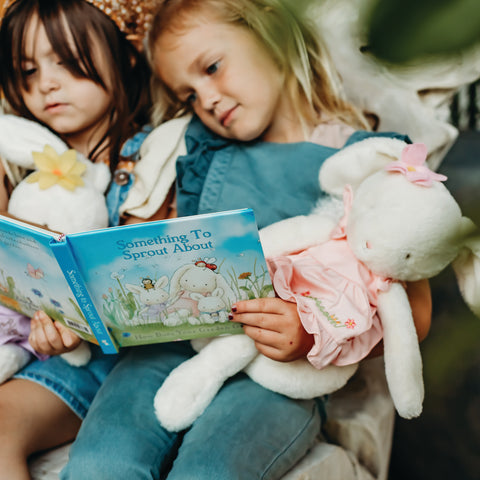5 Powerful Benefits of Reading Aloud to Children
We all have fond memories of listening to our favorite bedtime tales. Hearing stories is ingrained in our DNA as something that’s always been important to humankind, but the positive implications of reading out loud go well beyond the simple pleasures of storytime.
When we read aloud to our kids, they’re soaking up massive social, emotional, and cognitive benefits. Listening to stories helps set children up for success in life, not just in an academic way, but in a behavioral way as well.
Here are five of the most significant benefits to reading aloud to children:
1. Helps develop language skills and cognitive functioning
Perhaps the most obvious benefit of reading to a child is the academic ramifications. The more words children hear, the more they develop their language skills. Reading aloud to kids at an early age sets them up for academic success, and not just in reading and writing. Studies have shown that students who read the most achieve more and stay in school longer.
Of course, being read aloud to is also how kids learn to read for themselves. In a 1985 report put out by the Department of Education, researchers concluded that reading to children was the most effective way to build the knowledge required for reading. It teaches them phonemic awareness, visual and auditory processes, comprehension, and fluency.
But what’s most important is how this mental stimulation actually affects the brain. In a 2015 study by the American Academy of Pediatrics, brain scans taken of preschoolers during story time showed that being read to activates the part of the brain that supports visual imagery and comprehension. Listening to words causes children’s minds to work in important ways. This creates new synapses in their evolving brains, leading to the further development of their cognitive functioning.
As a parent, you can advance this development by engaging with your little one throughout the story. Kathryn Starke, a literacy specialist, suggests that “when parents ask children questions before, during, and after reading based on the illustrations and text, reading comprehension skills are increased.”
Reading also increases attention span, a benefit that is increasingly important in an age where our children are growing up with so much access to the digital world.
2. Creates a bond between caregiver and child
When we read to our children, we’re providing them with an opportunity for physical and emotional closeness. It’s a chance to learn more about each other, as you find out what makes your child laugh, cringe, or light up.
A soothing voice and physical touch give reassurance to the child, providing a sense of security and calm.
When you devote the time to read to your child, it sends them a message of comfort and love. They feel that they have your full attention. As childhood educator Kalev Rudolph says, “It shows both a level of commitment and a chance to explore new worlds together.”
3. Teaches how to navigate social situations and solve problems
Storytelling is a great way for kids to learn how to deal with difficult situations and solve problems. When children hear stories about characters that are able to overcome obstacles, they learn how to face challenges in their own lives.

And the subject matter isn’t only helpful if it applies to their current world. Dorka Horvath, the founder of BOOKR Kids, writes that reading to young children “teaches them how to deal with people and situations that come up later in life”.
These stories also teach young learners a vocabulary that aids in their communication skills. “They learn to use words to describe feelings that are otherwise difficult and this enables them to better control their behavior when they have challenging feelings like anger or sadness,” explains Dr. Alan Mendelsohn, a developmental-behavioral pediatrician at NYU Grossman School of Medicine.
4. Eases problem behaviors and soothes anxiety
Studies have shown that reading to children curbs problem behaviors, especially when started at an early age. Data published by the American Academy of Pediatrics showed that three-year-olds who participated in reading aloud with their parents were significantly less likely to be aggressive or hyperactive.
Dr. Mendelsohn points out that when families read and play with their kids, they help them to learn how to control their own behavior.
Perhaps most touching is the personal experience shared by Amy Brotherman of My Three Readers. As a mother of a child with ADHD and anxiety, she has found reading aloud to her son to be a healing experience. “When we snuggle together so that I can read aloud to him a good book, he is transported into another world and temporarily relieved from his stress and anxieties, albeit for a short time. I can feel his body begin to calm, his heart to stop racing, and his tense body will begin to loosen next to me”, shares Amy.

5. Reduces educational disparities
It’s a fact that wealthy students statistically score higher on S.A.T. tests than students in poverty. The reasons behind this are threefold: affluent parents use more abundant vocabulary, have more literature around the house, and read to their children more often.
The more vocabulary children learn, the more they’re set up for academic success. The more language a child hears, the better they do in school. It’s one of the best ways to change the course of a child’s educational experience.
“Reading regularly to a child helps to close that gap and gives the at-risk child a ‘head’ start, especially important since most instruction in school for the first four years is oral...The larger the vocabulary, the better the child understands the teacher and the lesson,” writes Jim Trelease, author of New York Times bestseller The Read Aloud Handbook.
Thankfully, this educational gap has been closing, and it’s largely because of what’s happening inside our homes. More families are reading together and, importantly, more families have access to books and internet games that teach reading and writing.
Considering all these amazing benefits, reading is truly an important activity to share with our little ones. Best of all, it’s a powerful learning and bonding experience that we all have abundant access to.
Written by Karie Kirkpatrick
3 comments
You got my attention when you said that reading aloud to children could enhance their language skills which could set them up for academic success. This is something that I will consider because I noticed that my 3-year old son does not speak a lot, and I want him to learn how to express himself. I could imagine myself buying early reader chapter book series that could help my son to be motivated to speak up and share his feelings and emotions with us. https://amandamthrasher.com/fairy-childrens-books
I love this article! Thank you so much!!!
Thanks for mentioning reading aloud to kids since it can help them control their behavior. I’m wanting to read more bedtime stories to my daughter since she loves books, however, I can’t seem to find any good new ones. I’ll have to search online for bedtime stories that other moms like to read to their children. https://matchboxdreams.com/
